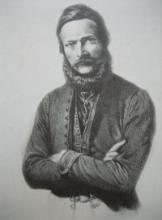Ľudovít Štúr
Ľudovít Štúr (1815-1856) was the leader of the Slovak national revival in the 19th century and the author of the Slovak language standard which gave rise to the contemporary Slovak literary language.
Štúr came from a teaching family and received his basic education at home. He learned German and Hungarian in Rabe, and from the year 1829 he attended the Lutheran Lýceum (preparatory high school and college) in Pressburg (Bratislava), which at the time included Professor Juraj Palkovič's famous Department of the Czechoslovak Language and Literature, the only such department at a Protestant school of higher education in the Kingdom of Hungary. During this period Štúr became a member of the Czecho-Slovak Literary Society, and in 1934 he became its chairman. Thereafter under his leadership the number of members of the Czech-Slav Society increased steadily.
On 24 April 1836 Štúr held a secret meeting in the ruins of Devín Castle, where 16 members pledged to work their whole life on the cultural uplifting of the Slovak nation.
After the end of his theological studies Štúr remained at the Lyceum, becoming Professor Palkovič's deputy from 1836-1838 and teaching the history of Slavic literature. During this period Štúr wrote poetry and worked with young people.
After the Czecho-Slovak Society was banned in 1837, Štúr founded the Institute of the Czechoslovak Language and Literature, within which the activities of the Czech-Slav Society continued.
From 1838-1840 Štúr attended the (Protestant) University of Halle in Germany, where he studied linguistics, history and philosophy. After returning to Bratislava in 1840 he condemned the prevailing pro-Hungarian politics in a series of articles and leaflets and in 1842 he organised the so-called Prestolný prosbopis, a Slovak petition to the Royal Court in Vienna protesting against forced Magyarisation in the church and schools and requiring the government to stop national persecutions by the Hungarians in Slovakia. For this action the commission investigated him as a religious enemy and a traitor and banned him from lecturing. At the same time he developed an action for the authorisation of newspapers and literary inserts.
On 2 February 1843 in Pressburg, Štúr and his friends decided to codify the Slovak language standard used today, based on central Slovak dialects – a common language that would unify all Slovaks speaking many different dialects. From 26-29 June of that year the Czecho-Slovak Literary Society was investigated and Štúr interrogated by a special committee convened at the Lyceum. The main accusation was 'treason of the Hungarian homeland'.
At the end of August 1844 Štúr took part in the creation of the Slovak cultural society Tatrín, which asked him to create the new Slovak grammar. In the meantime, he received permission to establish the Slovenskje národňje novini ('Slovak National Newspaper') and its literary addendum Orol Tatranský (('The Tatra Eagle'), written in the new Slovak language, in which Štúr gradually shaped a Slovak political programme based on the precept that the Slovaks were one nation and that they therefore had a right to their own language, culture, schools, and particularly political autonomy within Hungary.
On 10 May 1848 Štúr organised a meeting of representatives of the national movement with Hurban and Hodžu in Liptovsky Mikulas, where a pan-Slavik programme known as the Requests of the Slovak Nation was proclaimed. The provisional Hungarian revolutionary government was not willing to accept these and the situation developed into open hostility between Hungarian and Slovak revolutionaries, leading the Hungarian government to issue a warrant for their arrest.
Štúr and Hurban participated in the Prague uprising and after its suppression they went to Zagreb in order to gain financial support for the organisation of a military rebellion against the domination of the Hungarians. In early September in Vienna a Slovak National Council was formed by Štúr, Hurban and Hodža, which organised a expedition of volunteers in Brezova and Myjava. However, the uprising failed. Power in Slovakia was in the hands of the aristocracy. Freedom of the press was over and Štúr failed to restore his newspaper.
Towards the end of his life Štúr lived in Modra where he concentrated on literary activities. The police investigated him, and he could not leave Modra without police authorisation. At the end of 1855 he accidentally fell and shot himself while out hunting. As a result of his injuries he died on 12 January 1856.

